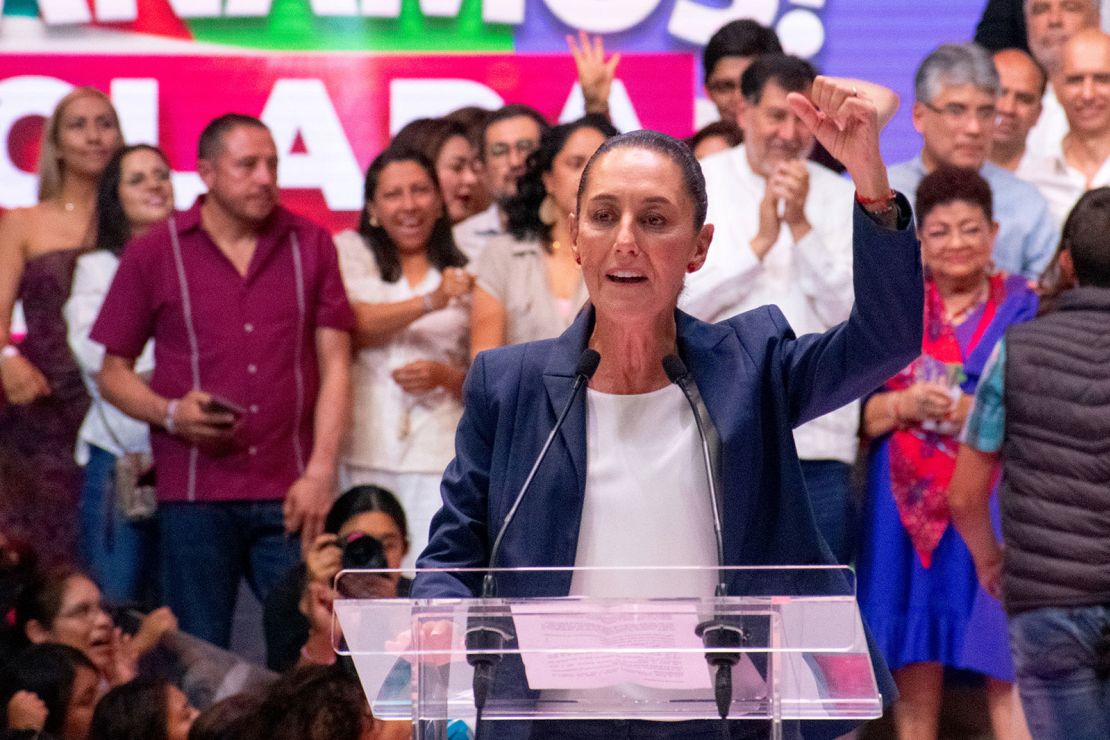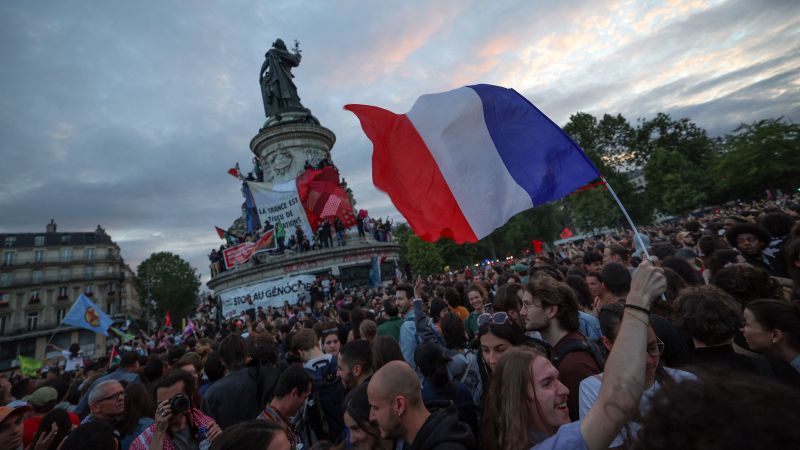A year of global elections, in which nations with half the world’s population are casting votes is proving punishing for incumbents struggling with the painful economic aftermath of the Covid-19 pandemic and the scandals and exhaustion that afflict leaders who spend years in power.
Elections in recent days in France and Britain have shown disgruntled but informed electorates using democracy in novel ways through tactical voting to reshape their countries. In Iran – even amid the highly restrictive circumstances of an election choreographed by the clerical autocracy, voters sprung a surprise and a hardliner lost.
So far, this mass global exercise of political self-determination has done as much to highlight the growing threats to democracy, the rule of law and the rise of populist leaders as to enshrine the principle that people should choose their leaders. In some countries, like El Salvador and Slovakia, leaders and parties with authoritarian instincts have cemented their power through the ballot box. In others, like Russia, they’ve strangled the rights of voters to extend their own rule. And there are rising concerns about how new leaders with strong mandates in nations like Indonesia and Mexico could use their power to centralize authority and erode democratic structures.
For leaders seeking reelection this year, there are sobering omens. Incumbency usually means vulnerability — as a landmark vote in South Africa demonstrated — and there is widespread angst in developed societies over cost-of-living crises. Populism is having another moment to mirror Britain’s vote to leave the European Union in 2016, which was quickly followed by Donald Trump’s election victory in the United States.
But democracy’s enduring capacity to channel public anger against the power of dominant leaders or to force change has also been on display from India to Senegal. And elections in Taiwan and South Korea proved the dynamism of the idea that free elections can promote stable governance.
Voting around the world is leading up to a critical election in the world’s most powerful democracy – the United States – in November. President Joe Biden, weakened by a disastrous debate performance that exacerbated voter concern about his age, is warning that a return to power by Trump — who tried to steal the 2020 election after losing it — poses an existential threat to the principle of government of the people, by the people and for the people across the globe.
Here are some of the most significant election results so far in 2024 that underscore what may turn out to be a pivotal moment for democracy.
The far-right made significant gains in elections to the European Parliament in June, though the populist wave fell short of some of the direst predictions of critics who warn that the continent’s democratic heritage could be at risk. Still, the fact that the ultra-conservatives did best in European Union powerhouses France and Germany is hugely significant. Despite the shuffled political deck, the center-right European People’s Party remains the biggest single force in pan-EU politics and European Commission President Ursula von der Leyen is expected to secure another term.
Sweeping gains by the far-right National Rally party of Marine Le Pen in the European elections prompted French President Emmanuel Macron to make a shock call for new legislative elections, as he pleaded with voters to neutralize the growing threat of extremism. The two round French election system once again kept the far-right out of power on Sunday but Macron’s gamble didn’t exactly pay off. A left-wing New Popular Front coalition emerged to foil Le Pen and the elections ended up empowering the far-left, which Macron had previously crushed with his new brand of centrist politics. An era of political turmoil now looms with a hung parliament, a likely shaky coalition and instability ahead of the next presidential election in 2027.
Voters last week ended the 14-year-rule of the Conservative Party marked by scandals, the UK’s vote to leave the European Union and political chaos that included five different prime ministers in eight years. The new Prime Minister Keir Starmer led his Labour Party to a landmark victory but faces a tough task in mending decaying public services with government finances depleted and with the economy hampered by the impact of Brexit.
Prabowo Subianto, a former army general, won the presidential election in the world’s fourth most populous nation, which is home to its largest Muslim population. Subianto is ostensibly a supporter of Indonesia’s vibrant but often fragile democracy where the military still looms as a key power player. But he has been shadowed by accusations of human rights abuses, especially during his military career during the rule of his father-in-law and dictator Suharto.
The world’s largest democracy sprung a surprise that showed the power of “one person, one vote” even in a nation where Prime Minister Narendra Modi has been accused of squelching the freedom of assembly and the press and eroding secular guarantees in the constitution. The Hindu nationalist leader did stay in power, but his hopes of capturing an unassailable parliamentary majority crashed. Modi’s Bharatiya Janata Party will now have to rely on coalition partners following a weeklong election that will be remembered for a prominent pollster bursting into tears on live television after botching an exit poll that missed the shock result.
The power of voters and the limits of democracy were, meanwhile, on show in neighboring Pakistan in February in a massive protest vote against the military that left allies of imprisoned former Prime Minister Imran Khan with the largest bloc in parliament. But two anti-Khan parties — the Pakistan Muslim League-Nawaz and the Pakistan People’s Party – united to keep the former cricket superstar’s affiliates from forming a government. Asif Ali Zardari, the scandal-tainted husband of assassinated former Prime Minister Benazir Bhutto, is now serving as president with an ally as prime minister.
Concerns about the erosion of democracy in South Asia were also intensified by the victory of Bangladeshi Prime Minister Sheikh Hasina in January in an election that the United States warned was not free and fair and that was marred by the arrests of thousands of members of the opposition.
There were no surprises in Russia, where President Vladimir Putin stage-managed voting to extend his one-man rule until at least 2030. The election was the first since the death of opposition figure Alexey Navalny in a prison colony. And those allowed to stand in opposition to Putin were controlled by the Kremlin with credible opposition figures all jailed, exiled or prohibited from running.
Strongman rule was also enshrined in El Salvador — through democratic means. President Nayib Bukele, the self-proclaimed world’s “coolest dictator” whose wild popularity as president is based on his purge against gangs, was overwhelmingly reelected. His dominance was boosted when his New Ideas party won a thumping congressional majority. Despite his popularity, critics warn that Bukele is seriously eroding democratic standards in his country.

Similar concerns about democratic institutions are being raised in Mexico after the historic election of the country’s first woman president, Claudia Sheinbaum. The left-wing climate scientist and physicist profited from the popularity of her longtime ally, President Andrés Manuel López Obrador. Sheinbaum, who will also be Mexico’s first Jewish president when she is sworn in, has the legislative majority to push through constitutional reforms that critics say will gut independent regulatory agencies, could politicize the judiciary and lead to few checks on executive presidential power.
The dynamism of democracy in Taiwan was showcased in an election that immediately intensified tensions with China. Lai Ching-te, the previous vice president, secured a historic third consecutive presidential election victory for his Democratic Progressive Party as voters shrugged off warnings by Beijing that their choice could increase the chances of conflict with a mainland government that insists Taiwan is part of China.
In South Korea in April, voters delivered a stirring demand for change by handing liberal opposition parties a majority in the legislature in a blow to President Yoon Suk Yeol and his conservatives. The election was shaped by public anger over a cost-of-living crisis and political scandals, including one swirling around the president’s wife.
Incumbents suffered another blow in Portugal in March when the socialist government was ousted by the center-right Democratic Alliance coalition. But the election was most notable for the rise of the radical right-wing party Chega, which took nearly a fifth of the vote for its leader André Ventura, a former trainee priest and football pundit. Many observers expect a new election soon because of the vulnerability of the minority government.
There was good news for Putin in Slovakia in April. Left-wing nationalist Peter Pellegrini won a presidential election in a boost to pro-Russian Prime Minister Robert Fico, who has sparked concerns over the rule of law and government interference in the media. The result, however, was soon overshadowed by an assassination attempt against Fico, who suffered serious injuries and suggested he was targeted because he broke with the dominant pro-Ukraine position in Europe.
Voters in South Africa also demanded change as the ruling African National Congress — the party of Nelson Mandela — lost its majority for the first time in 30 years in the most significant political shift since the ending of apartheid. The rebuke followed years of corruption scandals, economic mismanagement and rising violent crime. The political horse trading following the election produced an alliance that was even more stunning than the result. The ANC formed an agreement to form a government with its staunchest adversary — the White-led Democratic Alliance, which had been the official opposition to the ANC for years.
Senegal has long been seen as one of Africa’s most stable democracies, but that legacy seemed in doubt following a decision by outgoing President Macky Sall to delay the election, which triggered mass protests. Sall was, however, overruled by the country’s top court and the presidential election went ahead in March with opposition candidate Bassirou Diomaye Faye winning a majority and becoming, at age 44, the youngest democratically elected president in Africa days after he was released from prison in an amnesty granted by Sall.
Iran wasn’t supposed to have a presidential election this year. But the death of President Ebrahim Raisi in a helicopter crash forced snap polls that exacerbated a succession drama surrounding the 85-year-old Supreme Leader Ayatollah Ali Khamenei amid public frustration over economic conditions and clerical authoritarianism. Tehran’s religious leaders kept a lid on dissent and approved a slate of mostly hardline candidates. But reformist candidate Masoud Pezeshkian beat ultraconservative Saeed Jalili, amid the lowest turnout since the Islamic Republic was established in 1979. Pezeshkian has favored dialogue with Iran’s foes, particularly over its nuclear program, but the US said it did not expect Iran’s posture to the outside world to change since the Ayatollah wields ultimate power.
Read the full article here
